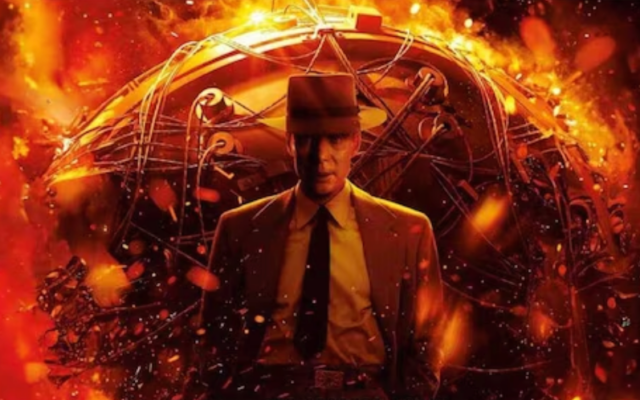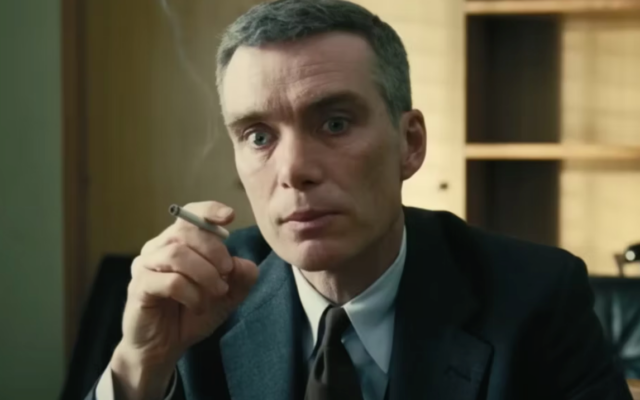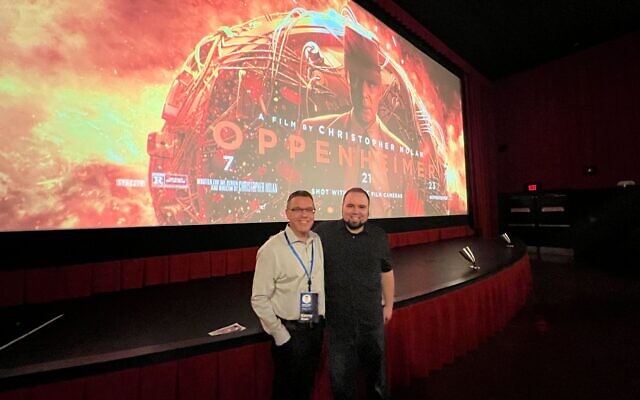AJFF Screens ‘Oppenheimer’ at Recently Reopened Tara
Films follows the conflicted political and professional life of the famed American nuclear pioneer.

The Atlanta Jewish Film Festival kicked off its new relationship with the recently refurbished Tara Theatre with a complimentary preview July 18 of the new summer blockbuster, “Oppenheimer.”
The film was written and directed in masterful style by the veteran Hollywood filmmaker, Christopher Nolan. It chronicles the moral and political struggle faced by the nuclear physicist, J. Robert Oppenheimer, who was instrumental in developing the world’s first atomic weapons during World War ll.
A capacity crowd, motivated in part by the free tickets the AJFF distributed and the massive publicity campaign the film has received in the last month, were welcomed by Kenny Blank, the AJFF’s executive and artistic director.
He used the screening to promote next year’s AJFF as something for everyone. Blank pointed out that there is a “misperception” that the AJFF is only for a small part of the community, when, in fact he emphasized it is an event which presents an international line-up with universal themes, that “really speak to all audiences.”

The Tara’s location, with its proximity to a younger urban demographic, is likely to play a significant role in next winter’s festival, which, Blank announced, will run from Feb. 13 to March 7.
But for its scale, star power, and pyrotechnic special effects, “Oppenheimer” is a brilliant example of the kind of film the AJFF has built its reputation upon.
It’s a multi-layered, intricately structured production that follows its highly conflicted central character through his many personal crises. The film chronicles the moral and political struggle of Oppenheimer, as he attempts to come to terms with his pioneering role in the development of the world’s most destructive weapons.
This sensitive and brilliant Jewish scientist is portrayed in a highly nuanced performance by the Irish actor Cillian Murphy, a frequent presence in Nolan’s films. Oppenheimer’s accomplishments led to a burst of worldwide acclaim after the nuclear bombs ended World War II in 1945.
That monumental effort was accomplished with some of America’s best scientific minds, including many who were also Jewish. In fact, in the film, Oppenheimer credits Hitler’s antisemitism that drove many great scientists from Europe and made the A-bomb possible. It was Albert Einstein, for example, who, as early as 1939, wrote a famous letter to President Franklin Roosevelt that urged him to begin a program to develop a weapon based on the fearsome power unleashed by the splitting of the uranium atom.

After his wartime success, Oppenheimer quickly became disillusioned with the massive destructive potential of the new bombs. He campaigned against further research and, in a critical, but disastrous meeting with President Harry Truman in October 1945, he told the American leader of his revulsion at the blood he felt was on his hands. Truman rejected Oppenheimer’s misgivings and later characterized him as a “crybaby.”
His fervent campaign against the new weapons, which he feared would lead to a new arms race with the Soviet Union, put him on a collision course with another influential Jewish political figure, Robert Strauss, convincingly played by Robert Downey, Jr. It’s one of the strongest performances of Downey’s career.
Strauss, a former Wall Street banker, who was well positioned in Washington’s Republican political establishment, was the first director of the Atomic Energy Agency. The heroic aura that is so apparent in “Oppenheimer” in the first two hours of the film is undermined by the relentless campaign that Strauss sets in motion to destroy Oppenheimer’s reputation in the third and final hour.

The production is based on the book, “American Prometheus: The Triumph and Tragedy of J. Robert Oppenheimer,” by Kai Bird and Martin Jay Sherwin, that won a Pulitzer Prize when it was first published in 2005. The film borrows liberally from the book to describe the so-called Red Scare that contributed to Oppenheimer’s downfall.
Part of the fear of Communist influence in America was the Soviet Union’s successful program to develop an atomic bomb of their own that was first tested in August 1949.

In 1954, Strauss used Oppenheimer’s support of left-wing political causes and both his wife and brother’s participation in the Communist Party in the 1930s to convince a government committee to refuse to renew Oppenheimer’s security clearance. He was branded a threat to national security and his career was effectively ended.
Nearly a decade later, President Lyndon Johnson, in a gesture seen as helping to rehabilitate his reputation, gave Oppenheimer the Enrico Fermi Presidential Award. It was for his life-long achievement in the field of energy. The award is named after a Nobel Prize winner, who was also an early nuclear pioneer.
- Arts and Culture
- film
- Bob Bahr
- Atlanta Jewish Film Festival
- Tara Theatre
- Oppenheimer
- Christopher Nolan
- World War ll
- Kenny Blank
- Cillian Murphy
- Albert Einstein
- President Franklin Roosevelt
- President Harry Truman
- Robert Downey
- Robert Strauss
- Atomic Energy Agency
- American Prometheus: The Triumph and Tragedy of J. Robert Oppenheimer
- Kai Bird and Martin Jay Sherwin
- Enrico Fermi Presidential Award



comments